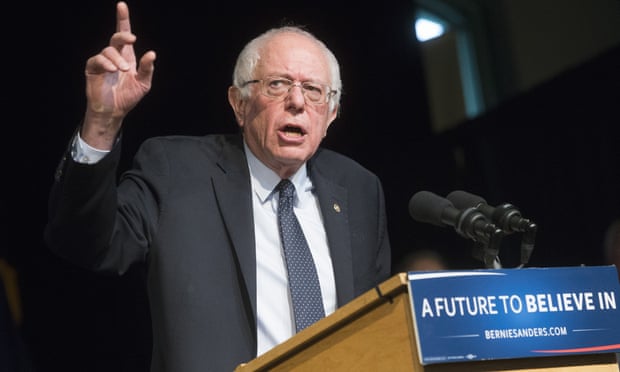Bernie Sanders' foreign policy judgment is better than Clinton's experience
Better judgment is what’s needed, not candidates with ‘experience’ who are calling for more of the same policies in the Middle East that led to war
As Bernie Sanders has risen in the polls, he has been taking increasing heat for some of his apparently vague foreign policy positions and the fact that his campaign does not have a team of establishment foreign policy advisers, unlike typical front-running candidates.
Instead of just questioning Sanders’ choice, we should really be questioning why any of the candidates of either party are employing the same old foreign policy advisers – many of whom not only supported the Iraq war but every disastrous military intervention since. These are the same people who now think that yet another regional war will somehow fix the chaos in the Middle East.
After a series of disastrous wars overseas, we should be looking for someone who has better “judgment” rather than candidates who have “experience” but are calling for more of the same policies in the Middle East that have led us into the mess we’re in now in the first place.
Nothing exemplifies this more than Hillary Clinton seemingly bragging about her foreign policy credentials at Thursday’s Democratic debate by citing her friendship with Henry Kissinger, who Christopher Hitchens called a war criminal. The former Nixon and Ford administration national security advisor and secretary of state is revered in DC foreign policy establishment circles but reviled just about everywhere else for his role in building or perpetuating multiple atrocities in east Asia during the late 1960s and 70s.
As Gawker editor Alex Pareene remarked during the debate: “Never say ‘I was flattered when Henry Kissinger said I…’ unless the end of that sentence is ‘finally made him pay for his crimes.’”
But it’s a far larger problem than the ubiquitousness of Kissinger, who still advises Republican candidates as well. The campaigns of Clinton, Ted Cruz and Marco Rubio have all been advised by the same foreign policy “consulting” group made up of former defense and intelligence officials who epitomize DC conventional wisdom. A gaggle of former Bush administration officials most known for their Iraq war and pro-torture advocacy advises virtually every Republican candidate outside Donald Trump.
And as you watch the candidates vie for who is the most “tough” when it comes to “destroying” Isis, it shows – there’s little difference in Clinton’s foreign policy versus the Republican candidates in the race besides a few rhetorical flourishes.
In general, the media’s campaign ritual of pretending candidates have “boned up” on foreign policy because they pay a bunch of people to give you a few briefings is largely a charade – not only do voters not care, but it’s not realistic measurement of a candidate’s “experience”. As Vox’s Max Fisher astutely pointed out, it’s usually goes like this:
1. The candidate hires a few foreign policy staffers who are considered credible and experienced by the Washington foreign policy community.2. The candidate meets with foreign policy graybeards within his or her party. While substantially meaningless, the meetings signal that the candidate has the implicit support of trusted elites.3. The candidate issues vague foreign policy proposals, or perhaps gives a vague foreign policy speech, reiterating his or her party’s conventional wisdom on a big issue or two.
While it is now a regular attacking point to some, it’s actually quite refreshing that Sanders has refused to play into this game. This doesn’t mean reporters shouldn’t sharply question Sanders about his depth of knowledge on global affairs; some of his policy proposals that do seem quite vague. However, the people who are repeatedly asking Sanders about his “we’ll get Arab country soldiers to fight Isis” talking point refuse to question Clinton’s equally vague “let’s set up a no-fly zone in Syria” policy, which we have absolutely no details on beyond the fact that it will require tens of thousands of US service members and will almost certainly drag the US into an even larger war in the region.
It’s also true, as his detractors claim, that Sanders often falls back on his opposition to the Iraq war when asked about his foreign policy expertise. But pretty much everything he said before the war did come to pass. He also refused to support the Libyan intervention in 2011, which has led to the chaos that engulfs Libya today and has us on the precipice of yet another war (an intervention, mind you, that Clinton was the key architect of inside the Obama administration). Clinton’s long “experience” as secretary of state doesn’t replace this lack of judgment, which is arguably much more important.
Again, this is not to say Sanders’s lack of detail on some foreign policy issues is not a legitimate issue: it’s certainly something we should question. In place of detailed policies, Sanders often falls back on the status quo as well. For example, Sanders told Meet the Press months ago, when asked about the Obama administration’s controversial drone policy and use of special forces troops in multiple countries, that as president he would do “all that and more”.
These are all well-founded problems. However, the fact that he has not brought on DC foreign policy “experts” to advise him that he needs to start more wars is certainly not one of them.
- The headline on this piece was changed on 6 February 2015.
http://www.truthdig.com/eartotheground/item/bernie_sanders_foreign_policy_judgment_is_more_valuable_20160207





Geen opmerkingen:
Een reactie posten